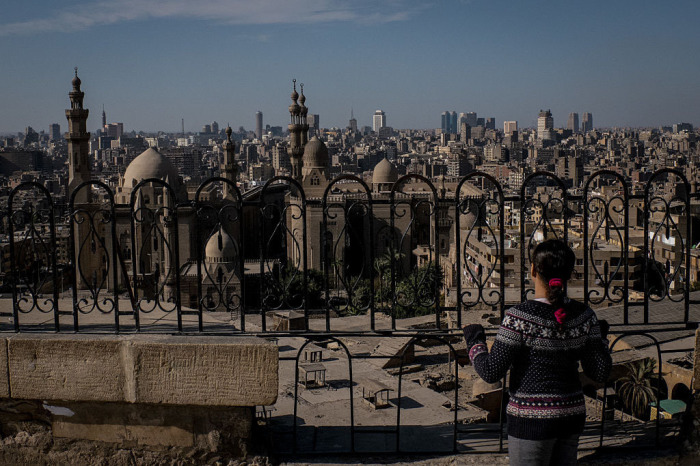Coptic Christian woman wins court case against Egypt's Islamic inheritance law

A Coptic Christian woman has won a major legal victory against Egypt’s Islamic inheritance law that greatly favors men.
Christian human rights lawyer Huda Nasrallah announced that a Cairo court ruled in her favor Monday, deciding that, as a Christian, she has a right to the same share of her father’s inheritance as her brothers.
The decision follows a nearly yearlong legal fight that has seen two other judges rule in favor of Egypt’s Islamic inheritance law that grants male relatives twice as much share of a family member’s inheritance as female relatives.
The Associated Press reported last week that when Nasrallah presented her case to a higher court she based her argument around a Coptic Christian doctrine that calls for an inheritance to be distributed equally.
On Tuesday, Nasrallah told AP that she is “thrilled” by the verdict and hopes it will serve as an encouragement to women in her country.
According to Texas Tech University law professor Gerry W. Beyer, recent cases and sentiment on the issue in Egypt did not bode well for Nasrallah. Additionally, leaders at Egypt’s Al-Azhar University, regarded as the most prominent Sunni religious institution in Egypt, have rejected equal inheritance proposals.
Samuel Tadros, a senior fellow at the Hudson Institute’s Center for Religious Freedom in Washington, D.C., called the decision a “significant development” in a Twitter thread, but stressed that “only time will tell about its scope.”
“On the other hand, we still don't have the court's reasoning,” Tadros, the author of Motherland Lost: The Egyptian and Coptic Quest for Modernity, added. “In Hoda's case, there was no contest. Her brothers joined her in her demand. So if the court simply found no objection and hence ruled in her favor, the case's scope would be very limited.”
Although Nasrallah’s brothers were on her side in the case, complaints have been raised in the past about how Coptic men “usurp the inheritance of women.” The Coptic Church has also been accused of overlooking the inheritance issue.
Tadros explained that if the court’s reasoning cited the constitutional clause that grants Copts “the right to resort to their own laws in governing their personal status affairs, then this is a huge thing.” However, he stressed the decision could bring both “positive and negative developments.”
“On the positive side, obviously the rights of Coptic women to equal inheritance. It would also be interesting to see what else would the courts consider as Christian personal status. Adoption?” He asked.
“On the other hand, this means that there is unlikely to be any movement on marriage and divorce issues. In those cases, while @PopeTawadros made significant practical moves on them (ones that got him curses from the old guard), these changes remain tied to him and not long term.”
Tadros assured that “any such movement should be understood as a return to the Dhimmitude framework.” He explained it is a framework in which “non-Muslim communities were allowed to govern their own internal affairs, but in which they are not equal citizens.”
Nasrallah is not the only Coptic woman to have successfully sued in the past for their right to equal inheritance. The AP reported earlier this month that Nasrallah was inspired by a 2016 Cairo court ruling in favor of a Coptic woman who fought the inheritance laws.
"It is not really about inheritance, my father did not leave us millions of Egyptian pounds," she told AP at the time. "I have the right to ask to be treated equally as my brothers.”
Egypt ranks as the 16th worst country in the world when it comes to Christian persecution on Open Doors USA’s 2019 World Watch List, which reports that “Islamic culture fuels religious discrimination in Egypt.”
On Saturday, Coptic activist Rami Kamil was arrested when police officers raided his home in Cairo. He is now facing “terrorism-related charges,” according to Christian Solidarity Worldwide.
CSW reports that the arrest occurred just a few days after Kamil accompanied the U.N.'s Special Rapporteur on Adequate Housing, Leilani Farha, on a fact-finding visit to Cairo and Minya.
Farha investigated the situation facing Egypt’s Coptic communities displaced from their homes following sectarian incidents.
“The charges against him are excessive, and his arrest lacks legal transparency,” CSW Chief Executive Merwyn Thomas said in a statement. “Rather than effectively criminalizing peaceful human rights work, the Egyptian government should focus instead on upholding the right to freedom of religion or belief and assisting citizens who have been displaced by sectarian violence, while continuing to identify and counter genuine sources of terror.”
In his Twitter thread, Tadros contended that the Egyptian government could tolerate Kamil as long as he was “just a local guy writing Arabic.”
“[B]ut once that is echoed abroad, once his message is heard outside, then he is dangerous,” Tadros asserted. “He is dangerous because his truth telling destroys the regime's propaganda in the United States which portrays President Sisi as the protector of Christians.
Follow Samuel Smith on Twitter: @IamSamSmith
or Facebook: SamuelSmithCP





























